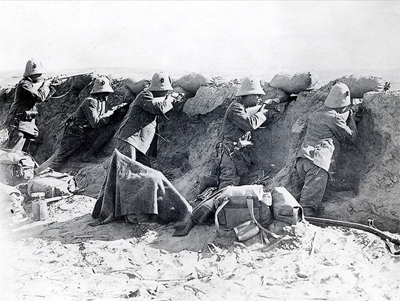

http://www.historyguy.com/egypt-israel_wars.htm
Arab-Israeli War of 1948 (1948-1949)–The First Arab-Israeli War, in which Egypt acquired the Gaza Strip. Egypt joined with several other Arab nations in an invasion of Israel in May, 1948 in support of Palestinian Arabs fighting against the newborn Israeli state. See Arab-Israeli Wars
Egyptian Seizure of the Israeli ship Bat Galim (Summer, 1954)—Egypt seized the Israeli ship Bat Galim as it attempted to enter the Suez Canal. According to various international agreements, the Suez Canal is supposed to be accessible to ships of all nations. This provoked worsening tensions between Israel and Egypt.
Israeli Raid on Gaza (Feb. 28, 1955)—Israeli forces conducted a raid, a response to repeated guerrilla attacks and the seizure of an Israeli ship by Egypt, which resulted in the deaths of 51 Egyptian soldiers and 8 Israeli troops. This raid was the largest of its kind against Arab forces since the end of the First Arab-Israeli War in 1949.–See Arab-Israeli Border Wars
Suez/Sinai War (1956)– Since the end of the First War with Israel, Egypt encouraged Palestinian raids against the Israelis from Gaza and Sinai. Israel made plans with Britain and France to attack Egypt. On October 29, 1956, Israeli troops invaded Egypt’s Sinai Peninsula and quickly overcame opposition as they raced for Suez. The next day, Britain and France, following suit, in response to Egypt’s nationalization of the Suez Canal, and on October 31, Egypt was attacked and invaded by the military forces of Britain and France. President Eisenhower of the United States pressured Britain, France and Israel into agreeing to a cease-fire and eventual withdrawal from Egypt. Militarily, Egypt was defeated by teh invading allies, but Nasser claimed a political and moral victory as British, French, and Israeli forces were forced to leave Egypt by the Great Powers.
Arab-Israeli War of 1967 (1967)– As the underlying tensions between the Arab nations and Israel remained unchanged since the First Arab-Israeli War of 1948-1949, the outbreak of a third major war was expected. The introduction of the American-Soviet competition and arms sales in the region only accelerated the likelihood of a Middle Eastern war evolving into a Cold War confrontation. the immediate cause of war in 1967 came out of Egypt’s decision to expel United Nations (UN) troops from the Sinai peninsula and blockade Israel’s port of Eilat. The UN forces were intended to form a buffer between the border separating Israel and Egypt, and their expulsion led the Israeli government to fear an imminent attack by Egypt. Fearing an attack by the Arab states, Israel launched a pre-emptive attack on Egypt, Jordan, and Syria. In this lighting war, Israel siezed the Gaza Strip and Sinai from Egypt, the West Bank and Jerusalem from Jordan, and the Golan Heights from Syria. See Arab-Israeli Wars
The War of Attrition (1968-1970)–After the shockingly quick defeat of the Arab nations by Israel in the 1967 Six-Day War, Egypt (supported by the Soviet Union), engaged in a low-level war of attrition with Israel along the Suez Canal and in the Sinai region. See Arab-Israeli Wars
Arab-Israeli War of 1973 (1973)–Also known as the Yom Kippur War by Israel, as the Ramadan War by the Arab nations, or simply, as the October War. In October, 1973, Egypt and Syria launched a surprise attack on Israeli forces occupying the Egyptian Sinai, and Syrian Golan. The Arab nations failed to defeat Israel, but this war set the stage for peace negotiations between Egypt and Israel. See Arab-Israeli Wars
Egypt and Israel signed a peace treaty in 1979. Egypt was the first Arab nation to make peace with Israel.. In 1982, per the peace treaty, Israel completed its withdrawal from the Sinai Peninsula, and the Sinai once again came under Egyptian control.
Sources:1. Kohn, George C. Dictionary of Wars. New York: Facts On File Publications. 1999.
2. Dupuy, R. Ernest and Trevor N. Dupey. The Harper Encyclopedia of Military History: From 3500 B.C. to the Present
New York, New York: Harper & Row. 1993.

